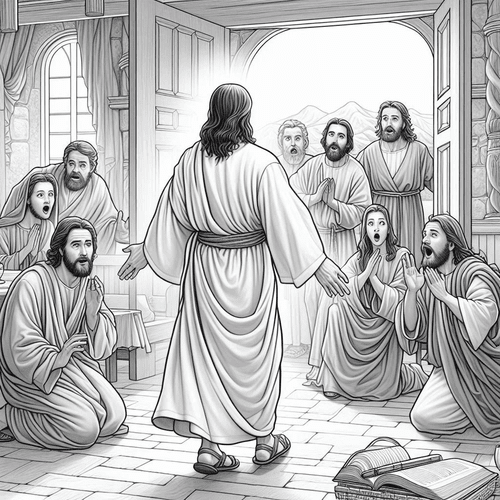Alpha and Omega: What Does Jesus’ Title Mean for Us?
ĹWhen Jesus declares “I am the Alpha and the Omega” in Revelation, He makes perhaps His most comprehensive claim to divine identity. While His other “I AM” statements in John’s Gospel reveal specific aspects of His ministry—as bread, light, shepherd, and way—this final declaration encompasses all of reality itself.
But what does the ancient title actually mean? And why should it matter to us today?
THE GREEK FOUNDATION: FROM FIRST TO LAST
Alpha (Α) and Omega (Ω) are simply the first and last letters of the Greek alphabet. Yet in Jesus’ mouth, they make a profound theological statement. Alpha signifies beginning, origin, and source—Christ as the creative Word through whom “all things were made” (John 1:3). Omega represents completion, culmination, and ultimate purpose—Christ as the goal toward which all creation moves.
This isn’t mere wordplay. When Jesus claims to be the Alpha and Omega, He’s asserting all of existence—from its first moment to its final consummation—finds its meaning, purpose, and very being in Him.
The title appears three times in Revelation (1:8, 21:6, 22:13), progressively revealing Jesus shares this divine designation with the Father. This is no accident. It’s a deliberate theological crescendo that culminates in Jesus’ direct claim to absolute deity.
THE REFORMED PERSPECTIVE: ETERNAL DECREE AND SOVEREIGN PURPOSE
Jesus as Alpha and Omega reveals something breathtaking about God’s eternal plan. Before the foundation of the world, Christ was already appointed as both the means and the end of redemption. This speaks directly to the Reformed doctrine of God’s eternal decree—His unchanging purpose that governs all of history.
Consider what this means for covenant theology. As Alpha, Christ stands behind the covenant of works made with Adam. As Omega, He perfectly fulfils the covenant of grace for His people. The entire redemptive narrative—from Eden’s fall to the glory of New Jerusalem—flows from Him and toward Him.
This also highlights the Reformed emphasis on divine immutability. Jesus doesn’t become the Alpha and Omega through His incarnation or resurrection. He eternally is the Alpha and Omega. His nature doesn’t change; rather, His eternal identity is progressively revealed through redemptive history.
For believers, this provides tremendous comfort. Our salvation doesn’t rest on shifting foundations but on Christ’s unchanging character. He who was the Alpha of our election before time began will be the Omega of our glorification when time ends.
THE BOTTOM LINE: JESUS IS GOD
Let’s be absolutely clear about what Jesus is claiming here. The Alpha and Omega title belongs exclusively to God. In the Old Testament, Yahweh declares Himself as the first and the last (Isaiah 44:6, 48:12). When Jesus appropriates this same designation, He’s making an unmistakable claim to full deity.
This isn’t subtle. Jesus is saying He possesses all the attributes that make God, God. He exists outside of time while governing all of time. He created everything while sustaining everything. He began everything while completing everything. These aren’t the claims of a good teacher or moral example—they’re the claims of God incarnate.
Jesus is truly God and truly man, united in one person forever. The Alpha and Omega declaration powerfully supports this truth. Only one who is genuinely divine could legitimately claim to encompass all reality from beginning to end.
LIVING BETWEEN ALPHA AND OMEGA
What does this mean for our daily lives? If Christ truly is the Alpha and Omega, several truths follow inevitably.
- We find our identity and purpose in Him alone. As Alpha, He’s the source of who we are. As Omega, He’s the goal of what we’re becoming. This liberates us from the exhausting search for self-made meaning and gives us unshakeable security in our divine calling.
- We can have assurance in our suffering. The trials we face aren’t random or meaningless. Christ, who controls both the beginning and end of our circumstances, works all things for our ultimate good (Romans 8:28). As Scripture emphasises, He who began a good work in us will certainly complete it (Philippians 1:6).
- Our mission gains eternal significance. We participate in Christ’s work of drawing His people from every nation, tribe, and tongue. Our evangelism and discipleship contribute to the great movement from Alpha to Omega—the gathering of the elect into God’s eternal kingdom.
THE NEW CREATION HOPE
Perhaps most remarkably, Jesus as Alpha and Omega points us toward the ultimate hope of new creation. He who spoke the first creation into being will also speak the final “Behold, I make all things new” (Revelation 21:5).
This isn’t mere restoration but transformation. The Omega isn’t simply a return to the Alpha but a glorious fulfillment that exceeds even Eden’s perfection. Reformed eschatology recognises both continuity and radical renewal in God’s final plan.
OUR RESPONSE
When we grasp Jesus truly is the Alpha and Omega—the eternal God who encompasses all reality—the only appropriate response is worship. After all, it’s He who holds our past, present, and future in His hands.
This changes everything. Our anxieties about tomorrow find peace in the Omega who has already secured our destiny. Our regrets about yesterday find forgiveness in the Alpha who chose us before time began.
In Christ, we’re held by the eternal love of the One who is both our beginning and our end. This isn’t merely a comforting thought—it’s the foundational reality of existence itself.
Even so, come, Lord Jesus.
ALPHA AND OMEGA: RELATED FAQs
Why did Jesus use Greek letters instead of Hebrew ones? The Greek alphabet was the universal language of the New Testament world, making Alpha and Omega immediately recognisable to both Jewish and Gentile audiences. Hebrew has no equivalent phrase that captures the same comprehensive meaning—“from Aleph to Tav” doesn’t quite carry the same theological weight. John’s use of Greek letters also emphasises the universal scope of Christ’s lordship, extending beyond Israel to encompass all nations and cultures.
- What do Reformed theologians say about this title? RC Sproul emphasised Alpha and Omega demonstrates Christ’s “eternal contemporaneity”—He exists simultaneously at every point in history while transcending it entirely. John MacArthur highlighted the title proves Jesus shares the incommunicable attributes of God, particularly His eternality and immutability. Both theologians stress this isn’t just about Christ’s role in salvation but His essential divine nature. Contemporary Reformed scholar Michael Horton notes Alpha and Omega reveals Christ as both the “efficient cause” (Alpha) and “final cause” (Omega) of all reality.
- How does “Alpha and Omega” relate to Christ’s role as mediator? As Alpha, Christ is the eternal Son who volunteered for the covenant of redemption before creation. As Omega, He’s the glorified God-man who will present the completed church to the Father. His mediatorial work spans from eternity past to eternity future—He didn’t become mediator after the incarnation but was appointed to this role in the eternal counsel of the Trinity. The title encompasses both His divine nature (sharing equality with the Father) and His mediatorial office (representing His people).
- Does the title appear in other ancient religious texts? While ancient religions sometimes used “first and last” language for their gods, the specific Alpha and Omega designation is unique to the Bible. Some Greek philosophical texts spoke of divine principles as “beginning and end,” but never with the personal, covenantal implications found in Jesus’ claim. The closest parallels are found in Jewish apocalyptic literature, but even these lack the direct divine identification Jesus makes. This uniqueness supports the argument that Jesus was making an unprecedented claim to absolute deity.
- What’s the significance of the title appearing three times in Revelation? The threefold repetition follows a pattern of progressive revelation—first attributed to God generally (1:8), then to the One on the throne (21:6), and finally to Jesus directly (22:13). Reformed theologian Greg Beale argues this demonstrates the economic Trinity at work: the Father’s eternal plan, the Son’s mediatorial execution, and the Spirit’s application (implied throughout Revelation). The three instances also correspond to Revelation’s structure: Christ’s current lordship over the churches, His future reign in the new creation, and His eternal identity as the divine Word. This isn’t mere repetition but theological crescendo.
How can pastors preach this title to help congregants grasp its meaning? Reformed homiletician Bryan Chapell suggests using concrete illustrations—Christ is like the author who writes both the first word and “The End” of history’s story. Sinclair Ferguson recommends emphasising the personal implications: Christ knows your Alpha (your beginning, your calling) and your Omega (your final destiny, your glorification). Many pastors find it helpful to connect Alpha and Omega to the Lord’s Prayer—“Thine is the kingdom” reflects His Alpha authority while “forever and ever” points to His Omega consummation. The key is helping people see this cosmic truth has intimate personal relevance for their daily struggles and eternal security.
ALPHA AND OMEGA: OUR RELATED POSTS
Editor's Pick

Do Christians Need Holy Shrines? Why the Reformed Answer Is No
Walk into a medieval cathedral and you'll encounter ornate shrines, gilded reliquaries, and designated "holy places" where pilgrims gather to [...]

I Want To Believe, But Can’t: What Do I Do?
"I want to believe in God. I really do. But I just can't seem to make it happen. I've tried [...]

BC 1446 or 1250: When Did the Exodus Really Happen?
WHY REFORMED SCHOLARS SUPPORT THE EARLY DATE Many a critic makes the claim: “Archaeology has disproven the biblical account [...]

Does God Know the Future? All of It, Perfectly?
Think about this: our prayers tell on us. Every time we ask God for something, we’re confessing—often without realising it—what [...]

Can Christian Couples Choose Permanent Birth Control?
Consider Sarah, whose fourth pregnancy nearly killed her due to severe pre-eclampsia, leaving her hospitalised for months. Or David and [...]

Bone of My Bones: Why Eve Was Created From Adam’s Body
"This at last is bone of my bones and flesh of my flesh!" Adam's joyful exclamation upon first seeing Eve [...]

Is Calvinism Fatalism in Christian Disguise? Think Again
We hear the taunt every now and then: "Calvinism is just fatalism dressed up in Christian jargon." Critics argue Reformed [...]

Can Churches Conduct Same-Sex Weddings?
In an era of rapid cultural change, churches across America face mounting pressure to redefine their understanding of marriage. As [...]

Gender Reassignment: Can Christian Doctors Perform These Surgeries?
In the quiet of a clinic, a Christian physician faces a challenging ethical question. A patient sits across the desk, [...]

‘What Sorrow Awaits You Who Are Rich…’: What Does Jesus Mean?
The words hang in the air like a sword over comfortable Christianity: “What sorrow awaits you who are rich, for [...]
SUPPORT US:
Feel the Holy Spirit's gentle nudge to partner with us?
Donate Online:
Account Name: TRUTHS TO DIE FOR FOUNDATION
Account Number: 10243565459
Bank IFSC: IDFB0043391
Bank Name: IDFC FIRST BANK






